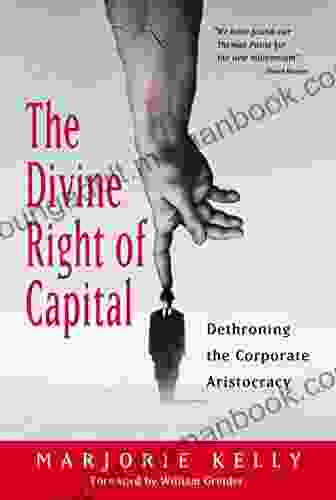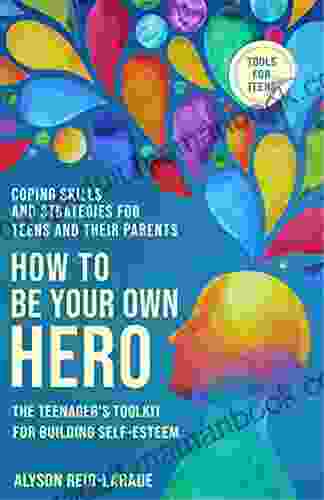The Divine Right of Capital: An In-Depth Exploration of the Doctrine That Gives Corporations Unchecked Power

The divine right of capital is a doctrine that holds that corporations have a natural right to make profits, regardless of the social or environmental consequences. This doctrine is based on the idea that corporations are independent entities, separate from the individuals who own and manage them. As such, they are not subject to the same moral or legal constraints as individuals.
The divine right of capital has been used to justify a wide range of corporate abuses, from environmental pollution to financial fraud. In recent years, it has been used to justify the increasing concentration of wealth and power in the hands of a few corporations.
4 out of 5
| Language | : | English |
| File size | : | 2911 KB |
| Text-to-Speech | : | Enabled |
| Enhanced typesetting | : | Enabled |
| Word Wise | : | Enabled |
| Print length | : | 290 pages |
| Lending | : | Enabled |
| Screen Reader | : | Supported |
The divine right of capital is a dangerous doctrine that has no place in a democratic society. It allows corporations to operate with impunity, and it undermines the ability of citizens to hold them accountable for their actions.
The Origins of the Divine Right of Capital
The divine right of capital can be traced back to the early days of capitalism. In the 16th and 17th centuries, a new class of merchants and traders emerged who began to accumulate great wealth. These merchants argued that they had a natural right to make profits, and that the government should not interfere with their activities.
The divine right of capital was enshrined in the writings of the English philosopher John Locke. In his book Two Treatises of Government, Locke argued that individuals have a natural right to property. He also argued that the government's only legitimate role is to protect individual rights, including the right to property.
Locke's ideas had a profound influence on the development of capitalism in the United States. The Founding Fathers of the United States were great admirers of Locke, and they incorporated his ideas into the Constitution. The Constitution protects the right to property, and it limits the government's ability to regulate business.
The Consequences of the Divine Right of Capital
The divine right of capital has had a number of negative consequences for society. First, it has led to the concentration of wealth and power in the hands of a few corporations. This concentration of power has given corporations the ability to influence government policy and to evade regulation.
Second, the divine right of capital has led to a decline in the quality of life for many people. Corporations have been given the right to pollute the environment, to exploit workers, and to sell dangerous products. This has led to a decline in public health, safety, and well-being.
Third, the divine right of capital has undermined democracy. Corporations have been able to use their wealth and power to influence elections, to lobby for favorable legislation, and to suppress dissent. This has made it difficult for citizens to hold corporations accountable for their actions.
The Case Against the Divine Right of Capital
There are a number of arguments against the divine right of capital. First, it is based on a false premise. Corporations are not independent entities, separate from the individuals who own and manage them. They are created by individuals, and they are owned and controlled by individuals. As such, they are subject to the same moral and legal constraints as individuals.
Second, the divine right of capital is harmful to society. It leads to the concentration of wealth and power, the decline in the quality of life, and the undermining of democracy. It is a doctrine that has no place in a democratic society.
The Way Forward
The divine right of capital is a dangerous doctrine that has no place in a democratic society. It is time to reject this doctrine and to demand that corporations be held accountable for their actions.
There are a number of things that can be done to challenge the divine right of capital. First, we can support public policies that promote economic democracy. These policies include measures to increase worker ownership of businesses, to promote cooperatives, and to regulate corporations.
Second, we can support civil society organizations that are working to challenge corporate power. These organizations are working to expose corporate abuses, to promote worker rights, and to protect the environment.
Third, we can educate ourselves about the divine right of capital and its consequences. We need to understand how this doctrine has been used to justify corporate abuses and to undermine democracy.
The divine right of capital is a challenge to democracy, but it is not insurmountable. By supporting public policies that promote economic democracy, by supporting civil society organizations that are working to challenge corporate power, and by educating ourselves about the divine right of capital, we can create a more just and equitable society.
4 out of 5
| Language | : | English |
| File size | : | 2911 KB |
| Text-to-Speech | : | Enabled |
| Enhanced typesetting | : | Enabled |
| Word Wise | : | Enabled |
| Print length | : | 290 pages |
| Lending | : | Enabled |
| Screen Reader | : | Supported |
Do you want to contribute by writing guest posts on this blog?
Please contact us and send us a resume of previous articles that you have written.
 Top Book
Top Book Novel
Novel Fiction
Fiction Nonfiction
Nonfiction Literature
Literature Paperback
Paperback Hardcover
Hardcover E-book
E-book Audiobook
Audiobook Bestseller
Bestseller Classic
Classic Mystery
Mystery Thriller
Thriller Romance
Romance Fantasy
Fantasy Science Fiction
Science Fiction Biography
Biography Memoir
Memoir Autobiography
Autobiography Poetry
Poetry Drama
Drama Historical Fiction
Historical Fiction Self-help
Self-help Young Adult
Young Adult Childrens Books
Childrens Books Graphic Novel
Graphic Novel Anthology
Anthology Series
Series Encyclopedia
Encyclopedia Reference
Reference Guidebook
Guidebook Textbook
Textbook Workbook
Workbook Journal
Journal Diary
Diary Manuscript
Manuscript Folio
Folio Pulp Fiction
Pulp Fiction Short Stories
Short Stories Fairy Tales
Fairy Tales Fables
Fables Mythology
Mythology Philosophy
Philosophy Religion
Religion Spirituality
Spirituality Essays
Essays Critique
Critique Commentary
Commentary Glossary
Glossary Bibliography
Bibliography Index
Index Table of Contents
Table of Contents Preface
Preface Introduction
Introduction Foreword
Foreword Afterword
Afterword Appendices
Appendices Annotations
Annotations Footnotes
Footnotes Epilogue
Epilogue Prologue
Prologue Flora Larsson
Flora Larsson Amanda Hanna
Amanda Hanna Sam Tranum
Sam Tranum Sara Ackerman
Sara Ackerman Helene S Herbert
Helene S Herbert Vashti Harrison
Vashti Harrison John C Waugh
John C Waugh Vauhini Vara
Vauhini Vara Naren Weiss
Naren Weiss Ananyo Bhattacharya
Ananyo Bhattacharya Jacob Riyeff
Jacob Riyeff Maurice Bloomfield
Maurice Bloomfield Allison Bruning
Allison Bruning Mary N Rowan
Mary N Rowan Diana Rosado
Diana Rosado Eva Reinhard
Eva Reinhard Shari Lapena
Shari Lapena Menopausal Marge
Menopausal Marge Novus Fishing
Novus Fishing Catherine Sophian
Catherine Sophian
Light bulbAdvertise smarter! Our strategic ad space ensures maximum exposure. Reserve your spot today!

 Henry Wadsworth LongfellowOedipus Rex: A Timeless Exploration of Fate, Destiny, and Free Will
Henry Wadsworth LongfellowOedipus Rex: A Timeless Exploration of Fate, Destiny, and Free Will Blake BellFollow ·17.1k
Blake BellFollow ·17.1k Marc FosterFollow ·6.5k
Marc FosterFollow ·6.5k Graham BlairFollow ·5.7k
Graham BlairFollow ·5.7k Richard SimmonsFollow ·19.4k
Richard SimmonsFollow ·19.4k Rex HayesFollow ·8.8k
Rex HayesFollow ·8.8k Jayson PowellFollow ·15k
Jayson PowellFollow ·15k Oscar BellFollow ·15.9k
Oscar BellFollow ·15.9k Larry ReedFollow ·6.3k
Larry ReedFollow ·6.3k

 Yukio Mishima
Yukio MishimaUnveiling the Zimmermann Telegram: A Pivotal Document in...
The Zimmermann Telegram, a diplomatic...

 George Martin
George MartinFearful Stories and Vile Pictures to Instruct Good Little...
In the annals of children's literature, few...

 Grant Hayes
Grant HayesJessica the Viscount Wallflower: A Tale of Transformation...
In the opulent ballrooms and glittering...

 Jerome Blair
Jerome BlairThe Economics of the Global Defence Industry: A...
The global...

 Blake Kennedy
Blake KennedyBreath of Heron - A Window into the Poetic Depths of...
In the realm of...
4 out of 5
| Language | : | English |
| File size | : | 2911 KB |
| Text-to-Speech | : | Enabled |
| Enhanced typesetting | : | Enabled |
| Word Wise | : | Enabled |
| Print length | : | 290 pages |
| Lending | : | Enabled |
| Screen Reader | : | Supported |











